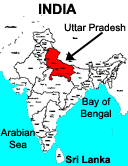 | Japanese Encephalitis Outbreak in India |
 September 19, 2005
September 19, 2005News agencies have been reporting about a recent outbreak of Japanese encephalitis in the Uttar Pradesh state of India. Approximately 750 people (mostly children) have died of the disease and many more people have been hospitalized. Unfortunately, more deaths are expected. Japanese encephalitis is caused by a virus carried by mosquitoes. Encephalitis is a general name for swelling of the brain. Some people infected by the virus may have a fever with a headache. People with more serious infections may have a headache, high fever, stiff neck, and tremors (shaking). Sometimes Japanese encephalitis can cause a coma, convulsions, paralysis and death. Patients with Japanese encephalitis are usually treated by helping them eat, making sure they can breathe adequately and reducing their seizures. Japanese encephalitis can be prevented by a vaccine, but some countries do not have enough money to vaccinate everyone. |
Hear It! |
Encephalitis |
| References and
more information about Japanese encephalitis:
|
| BACK TO: | Neuroscience in the News | Table of Contents |
![[email]](./gif/menue.gif) Send E-mail |
 Fill out survey |
 Get Newsletter |
 Search Pages |
